Addis Ababa
Introduction
I left Fairfield, Iowa by Amtrack train on December 31st 2010 bound for Chicago, and then flew to London meeting up with Miira and flying on to Addis on Jan 3rd. I had been working with Miira’s son Billy Moon on the text input software My-Text. The purpose of the visit was to work face to face with Billy and explore Addis. We were there for 22 days, returning to London January 26th 2011, then back to US.
Day 1. The Beginning
This is the morning after the first night in Addis. I slept until 11am. Last night Billy wanted me to film the descent and passage through airport, while he filmed the plane from the ground and we were both to stop filming when we met up. Then he would edit into one sequence using the time-stamps in the video clips. (He’s full of these projects). It was a challenge to keep the iPhone filming through passport control, but the officer just smiled and wished us a nice time here! In the States I’d have been thrown into Guantanamo Bay! In the event we were delayed because Billy’s harp (yes, we were taking it out to him…) got temporarily lost in baggage and his camera battery ran out. Oh well!
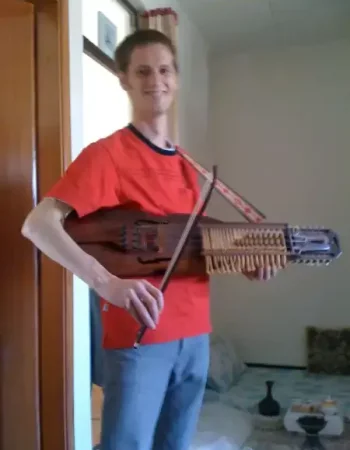
Billy with his nykel harp
Billy and Raheel’s flat is tiny but we each have a small room. They installed a water heater in our honour. Raheel is an amazing hostess, always attentive to our needs. She made coffee in an Arabian Nights brass contraption and the ceremony involved burning frankincense before the coffee was poured. Caffeine was the last thing I needed at 12:30 at night, but I just couldn’t deprive her of the joy of preparing it for us.
Billy and I have begun to sketch out the work-plan for the next three weeks. I think we will be able to send the working app to our graphics designer in a week or so. Will explore Addis later today.
Day 3: A bout de souffle!
I came quite unprepared for the breathlessness, having failed to bring two bits of knowledge together: Addis’s altitude and the resulting oxygen deprivation! Struggling with luggage up the nine external flights of stairs to Billy’s condo nearly terminated my visit prematurely. Even today I feel short of breath just strolling about.
We are on the top floor of a building on the highest hill in Addis. The panorama seen during the day is a 360 degree sweep of mountains containing the urban sprawl of concrete and tin roofs within its natural bowl. At night a star filled sky tempts you to lean a little too far out over a very un-European low balcony.
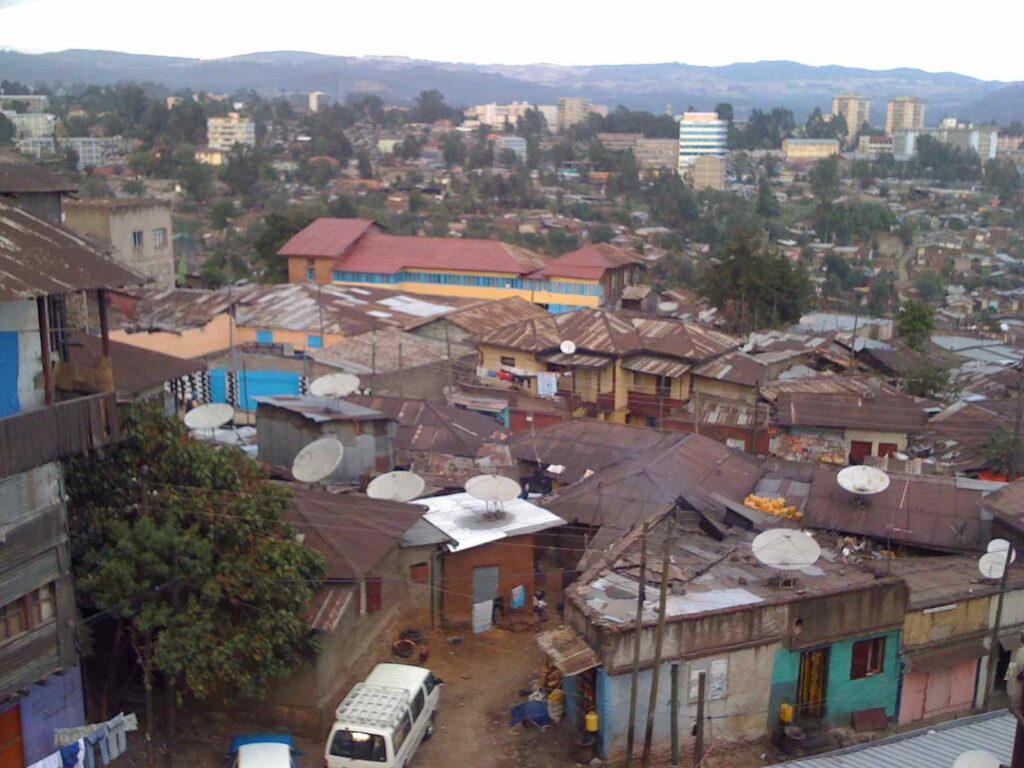
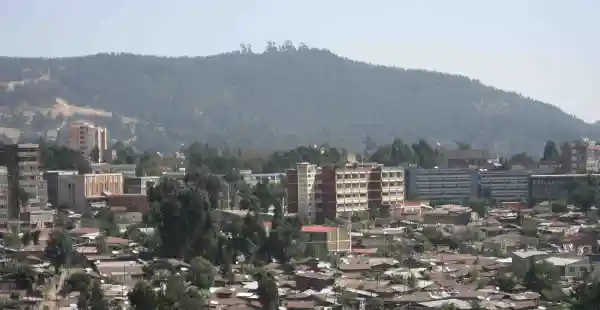
Views from balcony of Billy and Raheel’s apartment
In the evening a pleasant murmur of mixed music, song and conversation drifts up to our heights from the cafés in the street below. Back home such a sound would be disturbing, but here the African joy of life seems to imbue it with a friendly quality that is reassuring.
Foreigners are rare in this quarter and little children peep out from behind their mother’s skirts to stare at us with eyes wide with awe.
Today we persuaded Billy to buy Raheel a double electric cooking ring. So far she has been cooking sitting on a low stool in front of a tiny kerosene stove. But what she does to a simple vegetable soup with cinnamon and other spices ‘ol Jamie would die for!
Yesterday we had injera, a large pancake served with a piquant bean sauce (shiro). This is eaten by breaking a piece off with the fingers of the right hand, twisting it into the shape of a broken umbrella and dipping it into the sauce. This is then deftly popped into the mouth without letting the fingers touch the lips. (Traditionally eaten by the family from a communal dish).
Perhaps in deference to our European origins, or maybe as a precaution against our unskilled hygeine, Raheel served Miira and me with individual plates, while she and Billy ate from a shared dish…
And for brunch today in a local café: fatira, a delicious flaky pastry wrap all soaked in honey, containing a light omelette. Delicious!
Work with Billy began in earnest today. While I was reviewing his work so far (some great ideas in there such as a “glass sheet” image that slides up over the text allowing finger-writing without compromising editing), he calmly disclosed an Amaric script version that he coded as a light diversion one evening and a viable scheme for simplified Chinese!
It is 2:10am and this 9 hour jet lag is an issue. Let’s see if I can fall asleep…
Day 4. And a Partridge in a Palm Tree…
Believe it or not, today is Christmas in Ethiopia (something to do with Julian versus Gregorian calendars). Raheel has been busy for days preparing tulla (a drink fermented from an obscure green leaf), dufo (a large loaf baked over an open fire), and many other goodies. She has set up the coffee ceremony on a special woven grass mat and strewn green grass over the floor.
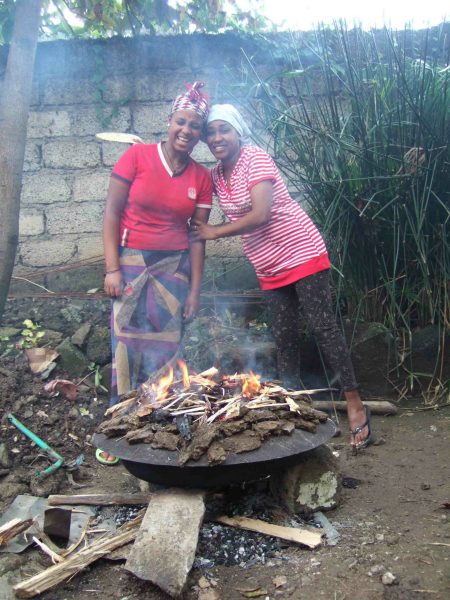
Raheel and cousin baking a dufo

Raheel and her freshly baked dufo
Yesterday we went on a trek through town and saw many live sheep trussed up like parcels and carried off home for Christmas dinner. And this morning two oxen were butchered in the courtyard below and distributed to all the waiting families.
The water supply here is switched off at 6pm and put on again at 8am. I suspect this is to avoid discovery of its limitations – far better for the authorities to decree a stoppage than it fail due to demand at the busiest time of evening cooking… Village life is used to storage and so the daily filling of pots before 6pm fits with tradition.
Anyway – this morning I baggsed a shower slot when the water came on again and I locked myself into the small bathroom. After compromising with the drip-feed flow and finishing quickly, I found the door lock had jammed and I was imprisoned in a tiny concrete cell. We tried for an hour (passing tools under the door and attacking from both sides) to get into the lock to release the bolt with my claustrophobia rising minute by minute. Finally Miira manouvred a small chair through the small window high in the wall and I managed to climb up and scramble out, landing on the balcony outside. Oh Happy Christmas day!
Day 6. Breathless
Altitude has held me captive for two days in my alcove, resting to avoid the pangs of suffocation every few minutes. Addis is 7,500 feet above sea level. Climbing web sites say 8,000 feet is the minimum height at which the sickness begins. I would not make a good mountaineer…
As I lay sleepless and gasping at 5am with all of Africa turning beneath a dome of fierce stars, the faint sounds of a returning day began. A baby cried, dogs barked hesitantly as if surprised at how they punctured the silence of the night and then the growling engines of the first lorries bridged the gap of distance, and the mundane world turned from the whispering stars to the busy day. A little later the sun turned on suddenly.
At the market this morning, the petite Raheel, realizing she had been overcharged for a pair of sandals, bashed the store-keeper over the head with them when he denied having sold them to her in the first place. I admire her spirit. Onlookers insisted he return the overcharging, which he did with poor grace! Afterwards she said it was not so much the overcharging as the denial that angered her.
After spending the afternoon programming, Billy suggested a break and we strolled over to the shabby but famous Taitu hotel. It had been silent in the apartment as Miira, Raheel and friend Ruth had gone off to see the Peacock Park and the Museum. In contrast the busy hotel was full of what appeared to be grizzled white Maugham explorers and attractive women journalists. We ordered tea and coffee which took half an hour to arrive. Billy discussed his childhood and then went on to explain that Raheel was a trained nurse and had specialised in AIDS counselling. I had only vaguely understood that she worked at a local clinic, and this news somehow explained the gentle solicitude apparent in her hospitality.
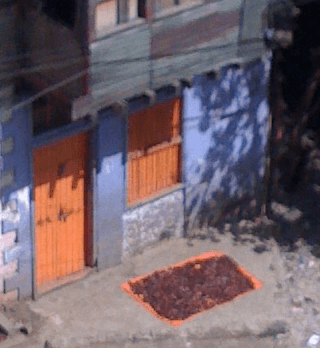
Bean pods laid out to dry in the sun
Day 7. Release at Last!
With hardly any transition, suddenly I am acclimatized and breathing easily. Hurrah! No more rasping inbreaths, holding lungs full until the electric suffocation subsides followed by a hasty exhalation. Breathing is now smooth, a joy! I am grateful for each breath…
Today I posted a card to brother Martin who hasn’t a computer. Billy has been here two years and never posted a letter. And yet he and I have exchanged many megabytes of data accross 10,000 miles, enough for several novels: all transient flickering binary bits. Such a contrast to writing a few heartfelt words onto a card with a pen. I made the mistake of licking the stamp with my tongue, however, and imagined the gradual onset of cholera every step of the walk home from the Post Office.
The bookstores here have no readable books, even though many are in English. Same for the little arrays of books on the dusty ground next to squatting vendors in the streets. All the books are educational, reference: “Fundamentals of Electrical Theory”; “World Geography”; Basic Bookkeeping”; “The Physics of Light”; “Metalworking” etc. I am not sure what I think of all this…
I am under a strict injunction from Billy not to give money to the beggars, particularly near to his apartment. I understand all the reasons, see all the consequences. However the immediate appeal for help, the pathos of the individual situation pulls terribly at my old heart. It is too much when some wide eyed little child skips alongside with her arms upstretched signalling hunger.
Tomorrow we set off for a two day expedition to the Ethiopian “Lake District” to stay at Debre Zeyit, a town 1500 feet lower than Addis and an hour’s journey to the south east.
Day 8. Holiday
Our ‘holiday in a holiday’ began today with a walk to catch a minibus.The minibusses collect passengers for their shouted destinations, and leave when full. Full is a flexible term, typically 12 passengers, and then trays of tomatoes, sacks of potatoes and bundles of spinach are fitted Escher-style into the remaining spaces. A 15 minute ride delivered us to ‘Mexico’ (the area around the Mexican Embassy) where we selected a bus for the onward journey to Debre Zeyit.
We were lucky that the bus going there was a ‘1 Class’ which means that the ceiling lights were more tasseled, the 25 seats were a little more comfortable and the engine a bit less likely to break down than a ‘2 Class’.
We all sat in a row on the back seat: Ruth, me, Miira, Billy and Raheel. A baby boy kept peering at us over his mother’s shoulders. The first stage of the journey was getting out of Addis along the main trade route that, far beyond our destination, eventually terminates in the sea port at Djibouti.
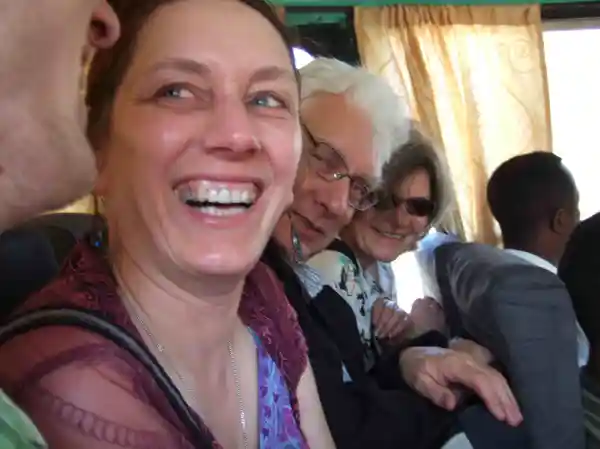
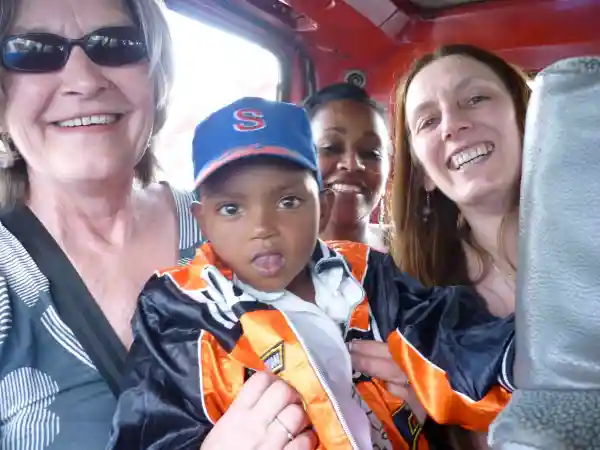
On the back seat of the bus
Crowded road: dust and diesel fumes. Concrete everywhere – in buildings, as lumps on the road, as blocks bristling with rusty rebar at the verges, as concrete dust in the air, on clothes, in your nose…
Lorries, cars, minibusses, busses and pedestrians all bumped along the road close together.
The road itself was amazingly being rebuilt while still carrying traffic, being dug deeper every day (why?), sections of roadworks shifting like mirages from one part of the road to another. Shops, garages, schools, apartment blocks had been left behind, teetering on cliff edges, as the road sank deeper and deeper…
This incredible sight was eventually left behind as we emerged into the countryside and ran downhill, down the mountain to Debre Zeyit.
On the way we glimpsed a mix of storage tanks, factories, fields (where oxen trampled the teff harvest), umbrella trees, eucalyptus and scrub. All dry, sunny, dusty and everything, amazingly, smelling of diesel fumes…
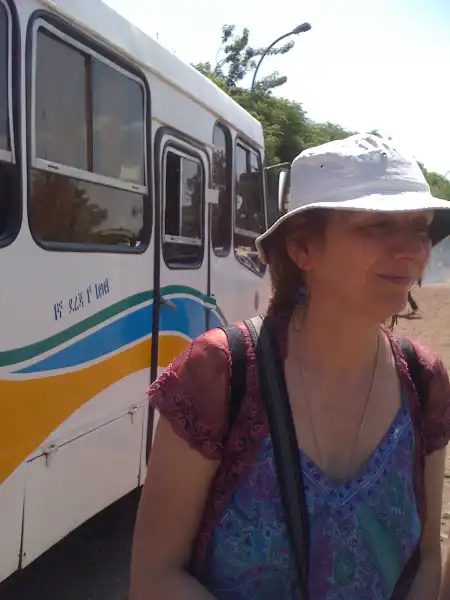
Arrival at Debra Zeyit
An uncomfortable half hour later we entered Debre Zeyit and manoeured to a halt in the gravelly bus compound. The last stage of the journey was a short ride in a three-wheeled taxi known as a bajij to the hotel. We needed two taxis as it was daytime and regulations limit their load to three passengers. At night, under cover of darkness, anything goes as we later discovered…
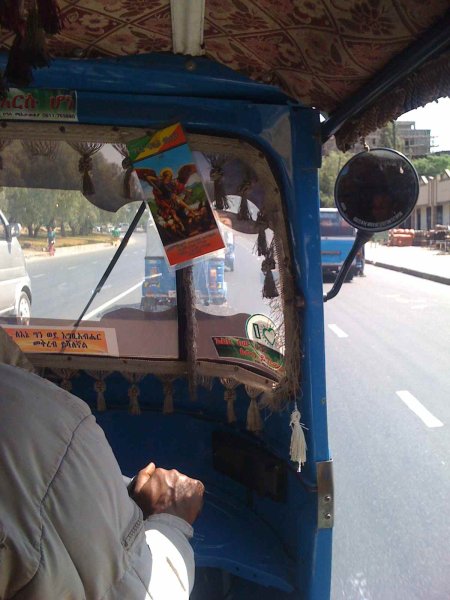
Onboard The Bajij
The Dreamland Hotel (www.ethiodreamland.com) is a well-designed but vaguely maintained terraced structure overlooking lake Bushoftu. The rooms are large and well furnished with the south wall all window facing a wide shared patio overlooking a beautiful view of the lake.
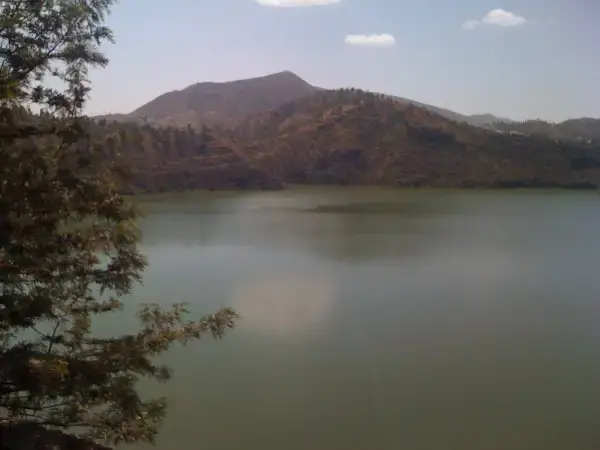
Lake Bushoftu from hotel terrace
We separated to our own rooms for a shower and rest, then lunched at the hotel restaurant. Afterwards the others went off to see a second lake, attracted by a lakeside café and a traditional meeting tree. I stayed, taking a siesta and afterward meditating while the sun sank down behind the mountains in the west.
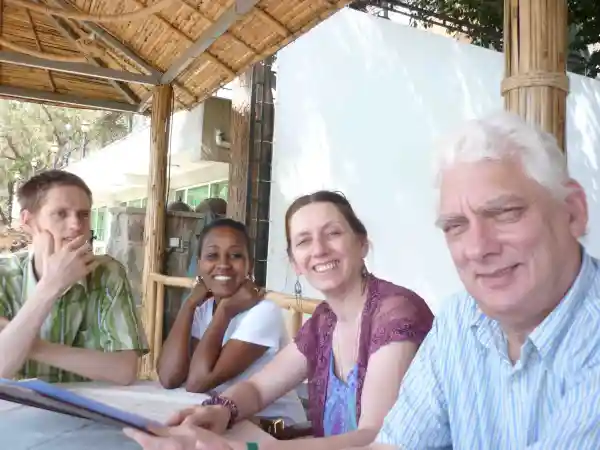
Lunch at hotel
That evening we set off to meet Raheel’s cousin and her friend at a traditional Ethiopian restaurant. The girls both veterinary students, the cousin in her second year and her friend in the fifth year of a six year course. The cousin was very beautiful with a relaxed tomboy manner, leaning slightly back in her chair and conversing brightly with Raheel in Amharic. Her friend was more reserved, sitting upright, her head wrapped primly in a scarf and illustrating her points with graceful sweeps of a hand flexed at the wrist. At the end of the meal we separated, our party piling into a single bajij and clattering back to our hotel, where we sat on the cool patio and talked until late.
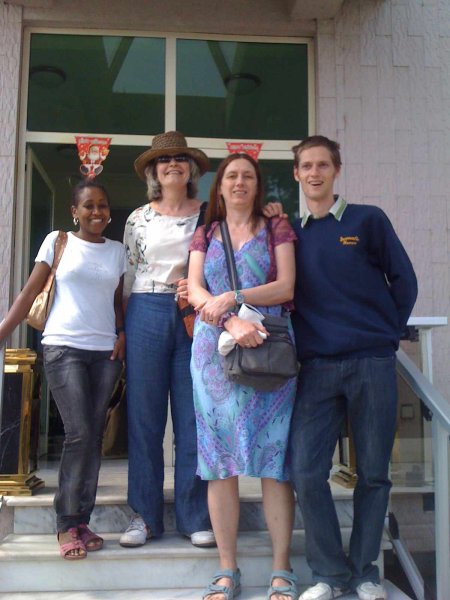
Raheel, Ruth, Miira and Billy leaving hotel
Day 9. The Garden Centre
On the second day of our break we caught a minibus to a ‘garden centre’ near the bus station because Billy and Raheel wanted to buy a plant for their apartment. The garden centre sold only plants, all in pots beneath shady net awnings. Extending perhaps an acre or so in a strip parallel to the road and fenced in by tall hedges of flowering shrubs and trees, it contained a series of small oases, each with a slightly raised earth platform with an umbrellad table and chairs.
Ruth bought a small papaya tree sapling for the friend she was staying with in Addis and Raheel chose a variegated green leaved plant whose foliage was arranged like the leaves of a pineapple. This needed two people to carry it any distance but a porter hugged it to his chest and followed us around as we explored. As we left he demanded a 15 Birr tip (half a day’s wages). This of course in Amharic which I did not follow at all until explained later, and so the porter refused my 1 Birr, which I then gave instead to an old lady who had come up with outstretched arm as we came out to the road. A bus for Addis came up at that moment so we all clambered aboard leaving behind a disgruntled porter and the old lady with a huge smile on her wrinkled face.
On the way back Billy and I discussed some changes to the specialised animated font we are developing for Android phones and which Ruth, who has a graphic design company in London, has agreed to design for us on her return home. The contrast between this work and our surroundings left me giddier than the diesel fumes!
Day 11. Exploring the Town
Am I really in Africa? As always the imagined place is different from the experienced one. The feeling of Addis Ababa is less cosmopolitan, less tidy-urban than I’d imagined. More like village life transposed into chaotic concrete, the outward show of city elements transformed by very different values.
In quiet moments the scope of Africa as a whole rolls out and away from this mountain coign in my imagination, still pristine as an image created from the writings of Laurens Van Der Post, Elspeth Huxley and Karen Blixen.
But what is Africa now? Too complex to be a single summary, too complicated for this little diary. And only real in terms of each individual experience, the million-sum becoming synthetic again and the material for academic attempts at hypothesis. How vast the expressions of Being!
So back to this one individual experience… Yesterday Miira and I went into town to see the famous gardens of the Ghion hotel. Pipes ran everywhere to water the plants throughout the nine dry months of the year. The trees were unfamiliar to me with strange leaves and flaky or gummy trunks. At this time there were few flowers, geraniums outnumbering the rest. The lawns were green but the fountains silent.
The gardens were separated from the dust and noise of the city streets and became a world apart for me. I settled into a tranquil mood. This deepened, and later, sitting in the empty hotel restaurant, I could have stayed in this state for the rest of the day. However, I was with a woman who wanted to shop…
Later we walked to the Exhibition Grounds which are at the top of a slope overlooking the Hilton and Ghion Hotels and behind these, on a distant hill, what we thought was Billy’s apartment block.
At the bottom of the slope there is a wide open space where street sellers hawk trays of small rubbish and the blue and white contract taxis gather. Sweeping uphill from this are terraced arcs of stone block seats like an amphitheatre. People were sitting on these seats chatting together or were running between them, along the arcs, exercising. At the top we entered tbe Exhibition Grounds through a tall twin arch.
And the current exhibition: The East Africa Electricity Conference! Ye Gods… I signed in as a company director and strolled round the booths. Mainly transformers and switchgear but I found an interesting display of an efficient woodstove that used less fuel per injera thus saving family time collecting firewood and conserving woodland.
Outside again we saw a very long queue for a cinema (the second we have seen) all waiting patiently for the show to start.
As we walked down the amphitheatre slope we saw in the open space below a circle of perhaps a hundred people, three or four deep, around an apparently empty space. When we got close we saw a solitary performer in the centre, juggling with a football. He was good, taking his shirt off and on while bouncing rolling and catching the ball on his head, forehead, shoulders, neck and back.
What was remarkable was the absorption of the crowd in the performance. They had been watching silently all the time we had been walking down the slope, and were still intent on the display when, after a few minutes, we turned away to get a taxi home. At the other end of the plaza a huge plasma screen showed environmental government projects without a single spectator…
It took me five minutes to haggle a taxi driver down from 90 to 60 Birr and then we sped back home.
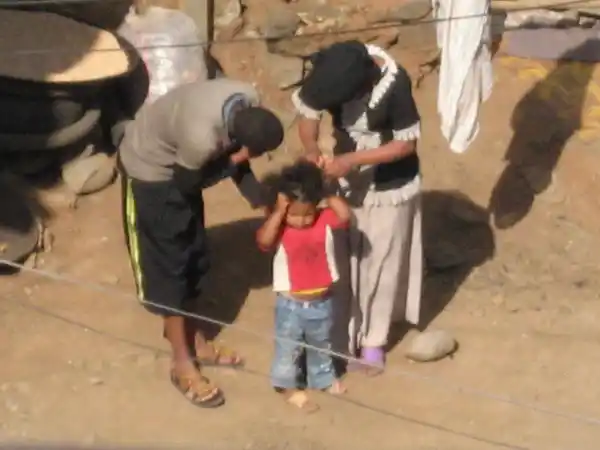
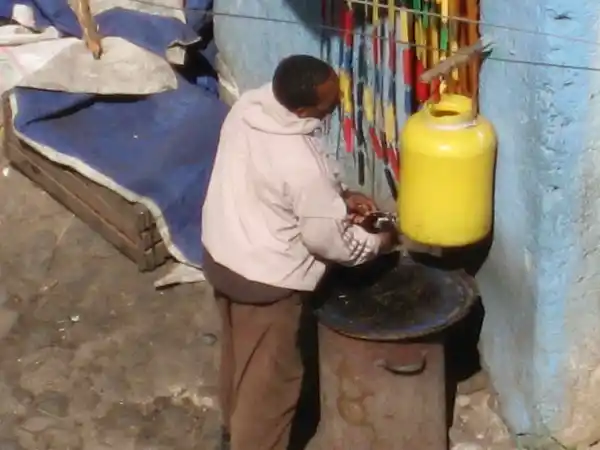
Day 12. An Evening Out
This evening we went to a traditional restaurant (in Ethiopia anything Ethiopian is called traditional). To me it seemed more like a night club, but I have been told I am wrong. The restaurant was on the ground floor of a large modern building but the interior was impressive: marble floor, stone pillars, vaulted ceiling, In the foyer an historical display of the defeat of the Italian invaders in the battle of 1896. In the restaurant itself: a dais with four musicians and a singer, a marble dance floor and a raised dining area with bamboo chairs and woven raffia tables. The whole space was large and open.
Before food is served the waitress pours warm water from a gracefully spouted kettle onto your hands, over a bowl. In Ethiopia each hand washes itself, a zen feat that takes a little practice, and once clean the hands are shaken dry, not dried with a towel.
The small tables exactly fitted a large tray that exactly fitted a large injera on which the various components of the meal were placed. Each party sits around a tray and eats from the same injera, tearing pieces off and wrapping the food in them with a deft pinching movement then popping the resulting parcel into the mouth. After the meal the same hand washing is repeated, and a coffee ceremony performed.
I have seen cofee ceremonies in private houses where beans are roasted in a small pan over a charcoal brazier, the resulting aromatic smoke passed around the group as a sort of blessing.
Here in the restaurant this step was omitted, but as usual frankincense was thrown onto live charcoals in a small container, sending a column of perfumed smoke into the air. The coffee itself was infused in an earthen flask-like pot with a loop handle and a thin tapering spout and then poured into tiny cups and taken with sugar. (At home herbs are often added during infusion.)
At intervals during the evening a troupe of eight dancers ran onto the floor and performed a series of dances from the various tribes in the country. Ethiopia is more an area containg a number of distinct tribes, each with its own traditions than a cohesive country, though the government is persuing sometimes brutal policies aimed at uniting these tribes. (The serious famine some years ago was caused not so much by drought as by forced relocation of tribes by the government onto land unsuitable for food cultivation.)
The dancing is extraordinary, consisting of vigorous shoulder and head movements combined with synchronised hip swaying and foot stamping, the dancers weaving and swirling about each other with exuberance.
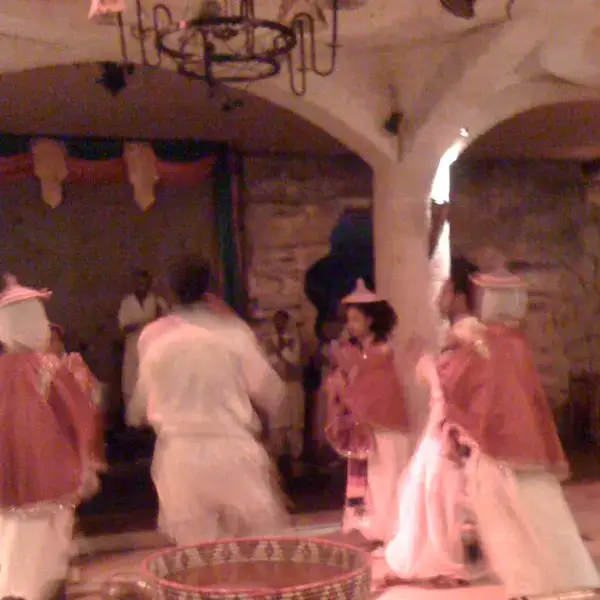
The women dancers wore beautiful loose fitting costumes that allowed free movemnt of shoulders and hips, while the men wore tight fitting tunics with loose sashes which they twirled about.
In one dance a girl is abducted, rather willingly, though with a token display of maidenly reluctance, by her lover and his pals, swept offstage, and later returned pregnant as a fait accompli to overcome the marriage objections of her parents
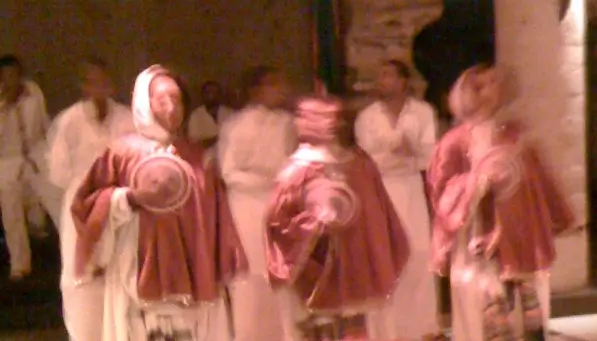
Day 13. Lunch at Toni and Messi’s
Billy’s friend Toni had invited us all to lunch at his house on the edge of the city. Two crowded minibus rides then a bajaj. Toni is a photographer and I first met him at Billy’s flat when he came a few days before with his camera and an assistant, just as the westering sun highlighted the eastern nmountains, to photograph the superb view from that height
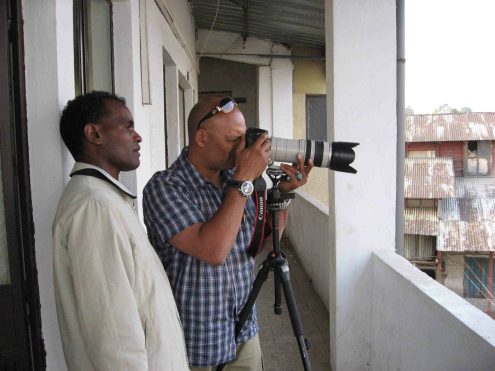
Toni and assistant photographing from Billy’s balcony
Toni is part Ethiopian and part Italian and proud of his Italian part. (He lived for seventeen years in Italy.) He had promised us home-made pasta, and as we entered his house he had a CD of popular arias playing on his HiFi. Toni is a warm hearted, big fellow, dwarfing his much younger, slim Ethiopian wife Messi. Messi and Raheel have been friends since their school days.
The house was at the developing south eastern edge of Addis, surrounded by wide half finished roads and many half completed houses and condos. His house stood within a sheet iron enclosure and was guarded by an Alsatian dog. The building was one storey, tiled concrete and the front door let directly into a large living room. The party consisted of our hosts, a Chinese couple and three Ethiopian friends.
The food was very good: Toni’s pasta with a choice of sauces and a mess of Chinese vegetables and fish. Billy was well known and well liked by everyone but after Toni had unexpectedly had to leave to get a vehicle for a distant photographic expedition the next day, the party tended to separate into the European and Ethiopian groups. We left at the end of the afternoon.
Day 14. Billy at Taitu Hotel
Remember the coding? Well Billy has been finding a conflict between family demands and the project work, so he and I decided to set up an office in the nearby Taitu Hotel. The Taitu is famous but shabby, and was the first hotel in Addis. Behind the main hotel building we discovered a maze of interconnected offices and meeting rooms where we hoped to rent a room for a week or so. But the manager would not rent an office for so short a period and so we ended up testing a few bedrooms in the hotel proper for internet reception. We chose a large room on the upper floor with a balcony that looked as if it was about to collapse and slide into the courtyard below.
The project is now delayed because, after we had solved the conflict between writing and editing, the coding of the editing module turned out to be far too complex done in graphics without the specialised font, and Ruth had missed her plane and arrived in London three days later than planned. Such is R&D!
Day 15. Google in Africa
Billy and I had registered for a Google presentation taking place at the Addis Hilton in the afternoon. The sudden transition from the chaos of Addis to the western environment of the Hilton made me realise that I function quite differently in each situation. Sitting in the meeting hall my mind snapped into its business mode, and faculties that I had been dimly groping for the previous two weeks were suddenly available.
It was interesting to see how Google are operating in Africa, increasing their profits by encouraging the use of the internet. The presentation was aimed at application developers and consisted of demonstrations of the setting-up of online forms and databases using Google Apps, and the integration of Google maps into web pages. Even I could follow the coding on-screen and suspect it was aimed a little lower than the capabities of the Ethiopian developers.
As the example form and database went live on-line during the coding demonstration, Billy started populating it from his iPhone to the puzzlement and then amusement of the audience.
Fibre-optic cables are being laid undersea to Ethiopia and will bring vastly increased bandwidth to the country within the next year or so, and Google’s main message to the developers was ‘be prepared’.
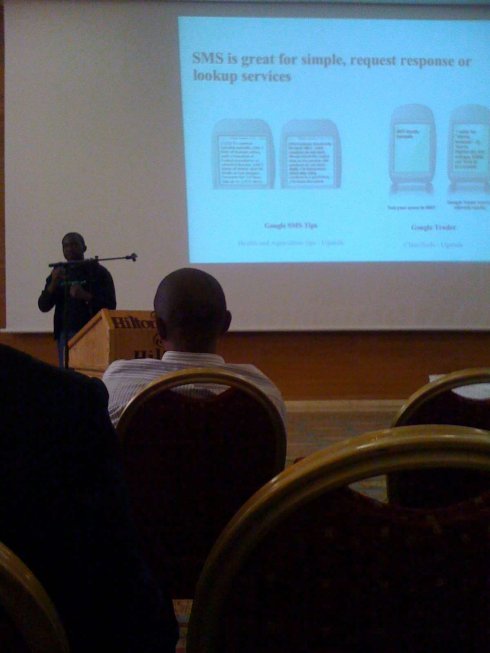
Google presentation
It is interesting to note that this enabling of internet usage (mainly accessed via mobile smartphones) will affect many sections of the population, including businesses catering to tourists, government departments, schools and the university and even (slightly far-fetched at present) the peasant farmers who will be able to find better deals for their produce.
We stayed in town and met up with Miira and Raheel to have supper at a small eating place near Billy’s previous flat. We sat on the veranda outside as the sun set. The others ate the usual injera and shiro but I asked for rice and vegetables, which turned out to be very good. Billy knew the couple running the place, who were very friendly.
Afterwards we went to a traditional restaurant in search of music. This was expensive by Ethiopian standards and had musicians, singers and dancers like the restaurant we visited last Saturday.
By chance we sat next to a party that included the Ethiopian Ambassador to Kartoum, who had previously been mayor of Addis for a total of seventeen years. Billy discretely Googled him on his iPhone and showed me his photo in a gap in the conversation. The Ambassador was courteous and friendly and welcomed us to Ethiopia, inviting us to eat with him. (I declined, explaining we had already eaten.)
From time to time he leaned towards me and explained the origins of each dance that was being performed.
Day 16. Epiphany
All day yesterday the Addis Christians were preparing for Dimket – the festival of Epiphany, stringing bunting accross the streets from electric pole to lamp-post. It is now the dry season but rain is always expected on Epiphany. It poured down in the night!
All day Wednesday and Thursday Billy and I were working in a rented room in the Taitu Hotel working out the details of function and menus for each of the eight screens of the app. Nuff said…
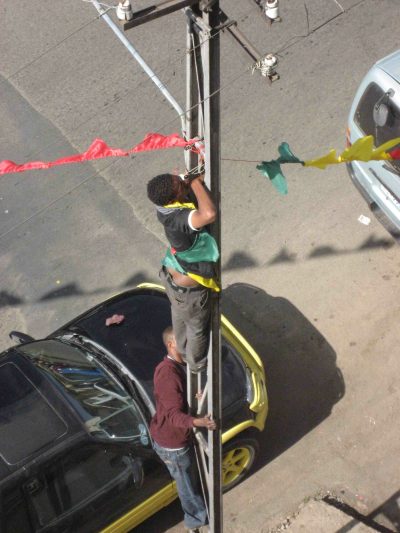
Stringing bunting from street pole
Day 19. Farewell!
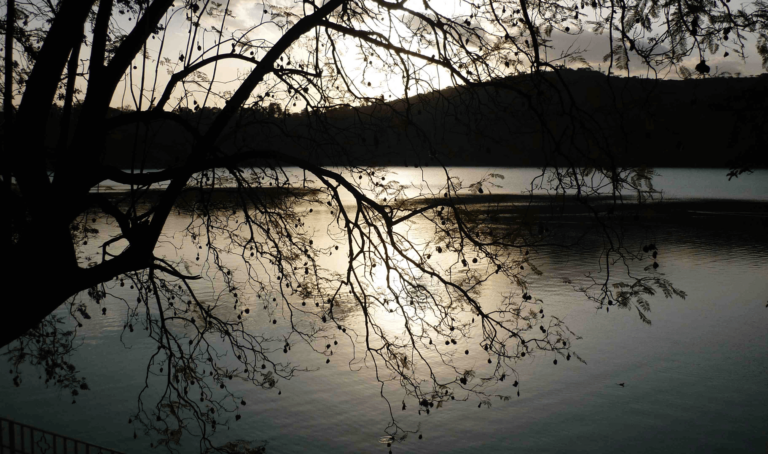
The visit draws to a close and my mind is now on what must be done in London. Time to close off this travelogue and post some more photographs for those of you (and I know who you are!) who don’t read the words…
It has been an interesting time. It was great to see Billy again and meet Raheel and their friends, see a glimpse of life in Addis Ababa and resolve all the outstanding issues in the app spec. We should have it finished in a week or so and then move on to the Android product (I seem to remember saying this at the start of this travelogue! Good job I am used to development delays…)
Thanks for following this, see you soon in Fairfield and in UK in the summer!
Geoff
